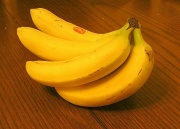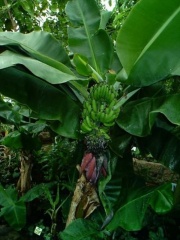Difference between revisions of "Banana tree"
Jump to navigation
Jump to search
m (Text replace - "== Authority ==" to "== Sources Checked for Data in Record ==") |
|||
| Line 9: | Line 9: | ||
[[File:Bananetreevt.jpg|thumb|Banana tree]] | [[File:Bananetreevt.jpg|thumb|Banana tree]] | ||
| − | == | + | == Physical and Chemical Properties == |
Palm-like tree growing to 25 m with large arching leaves (10 feet long) that are often split and torn. | Palm-like tree growing to 25 m with large arching leaves (10 feet long) that are often split and torn. | ||
| − | == | + | == Resources and Citations == |
| − | * | + | * Virginia Tech Dendrology website at www.fw.vt.edu/dendro/dendrology/main.htm (Accessed Dec. 9, 2005) |
| − | * Wikipedia | + | * Wikipedia: http://en.wikipedia.org/wiki/Banana (Accessed Dec. 9, 2005) |
[[Category:Materials database]] | [[Category:Materials database]] | ||
Revision as of 11:25, 29 October 2020
Description
A plant from the family Musaceae. Banana plants, such as the Musa sapientum, are grown in most tropical areas, such as the Philippines, Central and South America, the Caribbean and Africa, for its fruit. Several type of fibers obtained from the leaves of banana plants (see Banana fiber). Banana paper is a handmade, decorative paper produced from the pulp of banana stalks.
Synonyms and Related Terms
Musaceae; Musa sapientum; bananplante (Dan.); Banane (Deut.); plátano (Esp.); banana (Esp., It., Port.); banano (Esp.); cambur (Esp.); guineo (Esp.); banane (Fr.); banaan (Ned.); banan (Nor., Pol., Sven.)
Physical and Chemical Properties
Palm-like tree growing to 25 m with large arching leaves (10 feet long) that are often split and torn.
Resources and Citations
- Virginia Tech Dendrology website at www.fw.vt.edu/dendro/dendrology/main.htm (Accessed Dec. 9, 2005)
- Wikipedia: http://en.wikipedia.org/wiki/Banana (Accessed Dec. 9, 2005)

